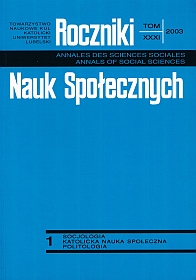Anthropological Foundations of Sport
Abstract
Sport plays at present an essential role in social life, and it is genetically conditioned by human psycho-physical needs. It is a multidimensional phenomenon. In its anthropological-ontological aspect, sport is 1) a rest after work, 2) a departure from everyday life and a quasi-festive experience, 3) an active play, 4) a game based on fixed rules and manifesting in a symbolical manner the changeability of human fortunes, 5) competition for victory (but not a brutal aggression), 6) a fascinating para-theatrical show, 7) a form of human auto-creation. Sportive activity may play the following anthropological functions in individual and social life: ludic, hedonistic, hygienic and health-promoting, recreational, competitive, theatrical, aesthetic, socio-integrating, educational, ethic-formative, military, and adaptive for a job.
References
Barlak M. (red.), Personalistyczna wizja sportu, Warszawa 1994.
Dziubiński Z. (red.), Teologia i filozofia sportu, Warszawa 1997.
Gerber E., Morgan W. (red.), Sport and the Body, Philadelphia 1979.
Jeu H., For a Humanism of Sport, Paris 1994.
Kosiewicz J., Myśl wczesnochrześcijańska i katolicka wobec ciała, Warszawa 1998.
Kowalczyk S., Elementy filozofii i teologii sportu, Lublin 2002.
Kowalczyk S., Zarys filozofii człowieka, Sandomierz 1990.
Lipiec J., Filozofia olimpizmu, Kraków 1994.
Mylik M., Filozoficzne podstawy sportu, Warszawa 1997.
Pawłucki A., Pedagogika wartości ciała, Gdańsk 1996.
Shlusher H. S., Man, Sport and Existence, London 1969.
Weiss P., Sport. A Philosophic Inquiry, London 1969.
Zuchora K., Wychowanie w kulturze fizycznej, Warszawa 1980.
Copyright (c) 2003 Roczniki Nauk Społecznych

This work is licensed under a Creative Commons Attribution-NonCommercial-NoDerivatives 4.0 International License.


